Fleurs du Mal Magazine


Or see the index
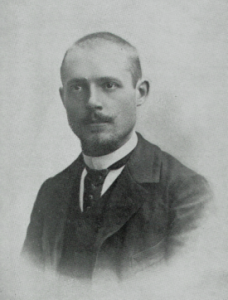
Quatrains
Cœur dur comme une tour,
Ô cœur de pierre,
Donjon de jour en jour
Vêtu de lierre.
De tous liens lié
A cette terre,
Ô cœur humilié,
Cœur solitaire.
Cœur qui as tant crevé
De pleurs secrets,
Buveur inabreuvé,
Cendre et regrets.
Cœur tant de fois baigné
Dans la lumière,
Et tant de fois noyé
Source première.
Ô cœur laissé pour mort
Dans le fossé,
Cœur tu battais encore,
Ô trépassé.
Ô cœur inexploré,
Vaste univers,
Idole décorée,
Jardin d’hiver.
Ô vase de regret
Plein jusqu’aux bords
Du venin d’un remords
Inespéré…
Ô vieil arbre écorcé,
Rongé des vers,
Vieux sanglier forcé,
Ô cœur pervers…
Cœur qui as tant saigné
D’amour, de haine,
Ô cœur mal résigné
De tant de peine.
Cœur tant de fois flétri
Au dur labeur,
Cœur tant de fois fleuri
Aux soirs de mai…
Cœur tant de fois forgé
Sous le marteau,
Cœur tant de fois crevé
Sous le couteau…
Cœur qui a tant rêvé,
Ô cœur charnel,
Ô cœur inachevé
Cœur éternel.
Cœur qui a tant battu,
D’amour, d’espoir,
Ô cœur trouveras-tu
La paix du soir…
Cœur tant de fois pétri,
Ô pain du jour,
Cœur tant de fois meurtri,
Levain d’amour.
Cœur qui a tant battu,
D’amour, de haine,
Cœur tu ne battras plus
De tant de peine.
Cœur dévoré d’amour,
Te tairas-tu,
Ô cœur de jour en jour
Inentendu…
Cœur plein d’un seul regret
Poignant et bref,
Comme un unique fret
Charge une nef.
Cœur plein d’un seul regret
Poignant et sourd,
Comme un fardeau trop lourd
Charge une nef.
Cœur vaisseau démarré
A charge pleine,
Vaisseau désemparé
De sa misaine.
Cœur plein d’un seul amour,
Désaccordé,
Ô cœur de jour en jour
Plus hasardé…
Dans ce noble séjour,
Cœur attardé,
Plein d’un secret si lourd,
Mur lézardé…
Ô cœur exténué,
Péri d’amour,
Ô cœur de jour en jour
Destitué…
Ô peine aux longs cheveux
Couchée au lit
De l’homme que tu veux
Enseveli.
Ô peine aux longs cheveux
Couchée au long
De l’homme juste et bon
Au même lit.
Enseveli sois-tu
Dans cet amour
Et dans cette vertu
Et cette tour.
Loué sois-tu, cœur frêle,
Pour ta rudesse,
Loué sois-tu, cœur grêle,
Pour ta tristesse.
Pour tes renoncements,
Ô dépouillé,
Pour tes abaissements,
Ô cœur souillé.
Cœur tant de fois cloué
Au dur gibet,
Tant de fois bafoué
De quolibets.
Et pardonné sois-tu,
Notre cœur, vil,
Au nom des Trois Vertus,
Ainsi soit-il.
Tu avais tout pourvu,
Ô confident,
Tu avais tout prévu,
Ô provident.
Tu avais tout pourvu,
Fors d’une fièvre,
Tu avais tout prévu,
Fors que deux lèvres…
Tu avais tout pourvu,
Fors une flamme,
Tu avais tout prévu,
Fors une autre âme.
Tu avais fait ton compte,
Ô prévoyant,
Tu n’avais oublié
Qu’un cœur battant…
Charles Péguy
(1873 – 1914)
Quatrains
• fleursdumal.nl magazine
More in: # Classic Poetry Archive, Archive O-P, Archive O-P, Peguy, Charles, WAR & PEACE
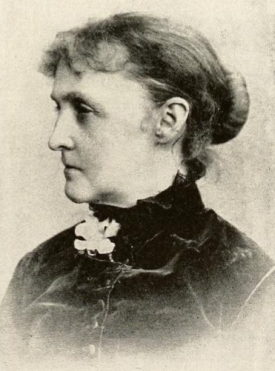
Hearing the Battle
July 21, 1861
One day in the dreamy summer,
On the Sabbath hills, from afar
We heard the solemn echoes
Of the first fierce words of war.
Ah, tell me, thou veilèd Watcher
Of the storm and the calm to come,
How long by the sun or shadow
Till these noises again are dumb.
And soon in a hush and glimmer
We thought of the dark, strange fight,
Whose close in a ghastly quiet
Lay dim in the beautiful night.
Then we talk’d of coldness and pallor,
And of things with blinded eyes
That stared at the golden stillness
Of the moon in those lighted skies;
And of souls, at morning wrestling
In the dust with passion and moan,
So far away at evening
In the silence of worlds unknown.
But a delicate wind beside us
Was rustling the dusky hours,
As it gather’d the dewy odors
Of the snowy jessamine-flowers.
And I gave you a spray of the blossoms,
And said: “I shall never know
How the hearts in the land are breaking,
My dearest, unless you go.”
Sarah Morgan Bryan Piatt
(1836–1919)
Hearing the Battle.
(July 21, 1861)
Poem
• fleursdumal.nl magazine
More in: # Classic Poetry Archive, #Editors Choice Archiv, *War Poetry Archive, Archive O-P, Archive O-P, WAR & PEACE
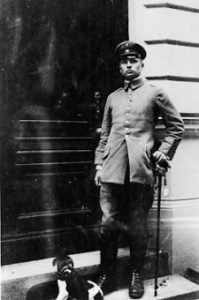
Der Dichter
Es neigte sich die Schar der jungen Knechte
Dem wirren Haar und dem zerschlißnen Rock.
Die Straße weiter taperte die Rechte,
Die Linke hielt sich krampfig fest am Stock.
Scham schlug ihm rot empor: er war betrunken
Und rang mit seinem Weg; und jäh erblaßt
War er im Rinnstein stolpernd hingesunken
Und raffte sich empor in wirrer Hast.
Da kam’s, daß er den Blick nach innen schlug,
Wo er, buntwechselnd wie Geleucht der Meere,
Wuchernder Blumen Fülle in sich trug.
Und atemraubend gab der süße, schwere
Duft seinem Sinn, der wie ein großer Falter
In ihre tiefen Rätselkelche sank,
Seltsamen Traum und schuf ihn zum Gestalter,
Der Lust und Qual in seine Lieder zwang.
So ging er, in sein Fühlen tief versunken,
Betäubt von Fiebern, Künder schwüler Nächte.
Man wich ihm schonend aus: er war betrunken.
Es neigte sich die Schar der jungen Knechte.
Hans Ehrenbaum-Degele
(1889 – 1915)
Der Dichter
Aus: Versensporn
•fleursdumal.nl magazine
More in: #Experimental Poetry Archive, *War Poetry Archive, - Archive Tombeau de la jeunesse, Archive E-F, Archive E-F, Expressionism, Expressionisme, Modernisme

Paradis est plus fleuri que printemps.
Paradis est plus moissonneux qu’été.
Paradis est plus vendangeux qu’automne.
Paradis est si éternel qu’hiver.
Paradis est plus soleilleux que jour.
Paradis est plus étoilé que nuit.
Paradis est plus ferme que le ferme décembre.
Paradis est plus doux que le doux mois de mai.
Paradis est plus secret que jardin fermé.
Paradis est plus ouvert que champ de bataille.
Paradis est plus vieux que saint Jérôme.
Paradis est le céleste pourpris.
Paradis est plus capital que Rome.
Paradis est plus peuplé que Paris.
Paradis est désert plus que plaine en décembre.
Paradis est public et qui veut vient y boire.
Paradis est plus frais que l’aube fraîche.
Paradis est plus ardent que midi.
Paradis est plus calme que le soir.
Paradis est si éternel que Dieu.
Paradis est sanglant plus que champ de bataille.
Paradis est sanglant du sang de Jésus-Christ.
Paradis est royaume des royaumes.
Paradis est le dernier reposoir.
Paradis est le siège de Justice.
Paradis est le royaume de Gloire.
Paradis est plus beau qu’un jardin de pommiers.
Paradis est plus floconneux qu’hiver.
Paradis est plus sévère que mars.
Paradis est plus boutonneux qu’avril.
Paradis est plus bourgeonneux qu’avril.
Paradis est plus cotonneux qu’avril.
Paradis est plus embaumé que mai.
Paradis est plus accueillant qu’auberge.
Paradis est plus fermé que prison.
Paradis est demeure de la Vierge.
Paradis est la dernière maison.
Paradis est le Trône de Justice.
Veuille seulement Dieu que route y aboutisse.
Route que cheminons depuis dix-huit cents ans.
Paradis est auberge à la très belle enseigne.
Car c’est l’enseigne-ci : à la Croix de Jésus.
Cette enseigne éternelle est pendue à la porte.
Charles Péguy
(1873 - 1914)
Le Mystère des Saints-Innocents
(1912)
• fleursdumal.nl magazine
More in: # Classic Poetry Archive, Archive O-P, Archive O-P, Peguy, Charles, WAR & PEACE
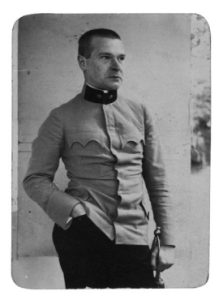
Abendländisches Lied
O der Seele nächtlicher Flügelschlag:
Hirten gingen wir einst an dämmernden Wäldern hin
Und es folgte das rote Wild, die grüne Blume und der lallende Quell
Demutsvoll. O, der uralte Ton des Heimchens,
Blut blühend am Opferstein
Und der Schrei des einsamen Vogels über der grünen Stille des Teichs.
O, ihr Kreuzzüge und glühenden Martern
Des Fleisches, Fallen purpurner Früchte
Im Abendgarten, wo vor Zeiten die frommen Jünger gegangen,
Kriegsleute nun, erwachend aus Wunden und Sternenträumen.
O, das sanfte Zyanenbündel der Nacht.
O, ihr Zeiten der Stille und goldener Herbste,
Da wir friedliche Mönche die purpurne Traube gekeltert;
Und rings erglänzten Hügel und Wald.
O, ihr Jagden und Schlösser; Ruh des Abends,
Da in seiner Kammer der Mensch Gerechtes sann,
In stummem Gebet um Gottes lebendiges Haupt rang.
O, die bittere Stunde des Untergangs,
Da wir ein steinernes Antlitz in schwarzen Wassern beschaun.
Aber strahlend heben die silbernen Lider die Liebenden:
Ein Geschlecht. Weihrauch strömt von rosigen Kissen
Und der süße Gesang der Auferstandenen.
Georg Trakl
(1887 – 1914)
Abendländisches Lied
• fleursdumal.nl magazine
More in: Archive S-T, Archive S-T, Trakl, Georg, Trakl, Georg

Schwermütig kam die Nacht …
Schwermütig kam die Nacht. Ich bin allein.
Rings wuchern Bücher, Möbel und Tapeten
Im gelben Licht der Lampe fremd und kalt.
Wie weh tun Sehnsucht, Nacht und Einsamsein!
Still möcht ich in dein junges Leben treten
Wie eine Wanderschaft durch einen grünen Wald.
Hans Ehrenbaum-Degele
(1889 – 1915)
Schwermütig kam die Nacht …
• fleursdumal.nl magazine
More in: #Experimental Poetry Archive, *War Poetry Archive, - Archive Tombeau de la jeunesse, Archive E-F, Archive E-F, Expressionism

Kunstenfestival Watou vindt plaats van 1 juli tot en met 3 september 2023 en krijgt de slagzin /kom.po’zi.ci.o:/ mee. Dertig kunstenaars en twintig dichters ‘componeren’ nieuw in situ werk.
Het kunstenfestival pakt dit jaar ook uit met enkele nieuwe locaties, een podcast met Jelle Van Riet en een poëziefietsroute met oorlogsgedichten.
Het startschot van het kunstenfestival werd gegeven met de lancering van een open call in de lente van 2022. 170 kunstenaars uit binnen- en buitenland stelden zich vorig jaar kandidaat voor Patchwwwork.
Een interdisciplinaire en internationale jury selecteerde dertig kunstenaars die in de zomer van 2022 in het dorp kampeerden. Ze gingen in dialoog met de inwoners, voelden het landschap en dompelden zich onder in het festival dat die zomer plaatsvond. Op basis van hun ervaringen, werkten ze projectvoorstellen uit voor nieuwe installaties. Uit deze voorstellen selecteerde de jury 19 projecten die te zien zijn op Kunstenfestival Watou 2023.

Deelnemende kunstenaars
Beatrijs Albers en Reggy Timmermans (BE) – Niels Albers (NL) – Funda Zeynep Ayguler (DE) – Iwert Bernakiewicz (BE) – Sven Boel (BE) – Cloé Decroix (FR) – Alexandra Dementieva (BE) – Niel de Vries (NL) – Griet Dobbels (BE) – Philippe Druez (BE) – Juls Gabs (UK) – Benoît Géhanne (FR) – Marilyne Grimmer (FR) – Marc Hamandjian (FR) – Nathalie Hunter (BE) – Maarten Inghels (BE) – Pierre Mertens (BE) – Charlotte Mumm (DE) – Öznur Özturk (BE) – Alain Platel en Berlinde De Bruyckere (BE) – Jiajia Qi (NL) – Henk Schut (NL) – Robert Ssempijja (UG) – Joris Vermassen (BE) – Koen Vanmechelen (BE) – Louisiana Van Onna (NL) – Wouter Vanderstede en Peter Simon (BE) – Various Artists – Esther Venrooij (NL) – ZONDERWERK (BE)
& Dichters
Alara Adilow (NL) – Anna Broeksma (NL) – Joost Decorte (BE) – Lotte Dodion (BE) – Radna Fabias (NL) – Marie Ginet (FR) – Max Greyson (BE) – Luuk Gruwez (BE) – Maarten Inghels (BE) – Ilya Kaminsky (US/UKR) – Mustafa Kör (BE) – Caroline Lamarche (BE) – Marije Langelaar (NL) – Delphine Lecompte (BE) – Lisette Lombé (BE) – Gerry Loose (UK) – Nisrine Mbarki (NL) – Tijl Nuyts (BE) – Johanna Pas (BE) – Siel Verhanneman (BE)
Kunstenfestival Watou 2023
More on website:
https://www.kunstenfestivalwatou.be/
& https://www.poperinge.be/
• fleursdumal.nl magazine
More in: # Music Archive, #Modern Poetry Archive, *War Poetry Archive, AUDIO, CINEMA, RADIO & TV, DANCE & PERFORMANCE, Exhibition Archive, Land Art, THEATRE, Watou Kunstenfestival

Von des Daseins körperlicher Schwere …
Von des Daseins körperlicher Schwere
Überfallen, bedrückt und tief gehemmt,
Dürstet mein Gemüt nach einer Leere.
Draußen haben blasse Abendmeere
Straßen trüb und traurig überschwemmt.
Und die Stadt sinkt wie verwest und grau
In den Schoß der mütterlichen Nacht.
Tief in meiner Seele weint und wacht
Die Erinnerung an eine Frau,
An ein Lied, ein Buch, an Sonne, Blau,
An viel Not, an manche Lust und Pracht.
Schwach durchzittert vom Geläut der Qual
Treibt mein Tag in eine ernste Stille.
Dunklen Himmels glanzlose Pupille
Starrt durchs Fenster hoffnungsblind und fahl.
Hans Ehrenbaum-Degele
(1889 – 1915)
Von des Daseins körperlicher Schwere …
• fleursdumal.nl magazine
More in: #Experimental Poetry Archive, *War Poetry Archive, - Archive Tombeau de la jeunesse, Archive E-F, Archive E-F, Expressionism, Modernisme
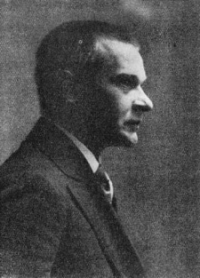
Grodek
Am Abend tönen die herbstlichen Wälder
von tödlichen Waffen, die goldnen Ebenen
und blauen Seen, darüber die Sonne
düstrer hinrollt; umfängt die Nacht
sterbende Krieger, die wilde Klage
ihrer zerbrochenen Münder.
Doch stille sammelt im Weidengrund
rotes Gewölk, darin ein zürnender Gott wohnt
das vergoßne Blut sich, mondne Kühle;
alle Straßen münden in schwarze Verwesung.
Unter goldenem Gezweig der Nacht und Sternen
es schwankt der Schwester Schatten durch den schweigenden Hain,
zu grüßen die Geister der Helden, die blutenden Häupter;
und leise tönen im Rohr die dunkeln Flöten des Herbstes.
O stolzere Trauer! ihr ehernen Altäre
die heiße Flamme des Geistes nährt heute ein gewaltiger Schmerz,
die ungebornen Enkel.
Georg Trakl
(1887 – 1914)
Grodek
• fleursdumal.nl magazine
More in: Archive S-T, Archive S-T, Trakl, Georg, Trakl, Georg
Clive Branson (1907–1944) was born in Ahmednagar, India, the son of a major in the Indian army.
He studied at the Slade School of Art and exhibited at the Royal Academy when he was just 23. Five of his paintings are today in the Tate. His daughter is the painter Rosa Branson.
 In 1932 Branson joined the Communist Party. He taught for the National Council of Labour Colleges, spoke at weekly open-air meetings on Clapham Common and with his wife Noreen managed a Party bookshop. He took a leading role in driving Mosley’s British Union of Fascists out of Battersea, was responsible for the formation of a local Aid Spain Committee and fought with the International Brigades in Spain.
In 1932 Branson joined the Communist Party. He taught for the National Council of Labour Colleges, spoke at weekly open-air meetings on Clapham Common and with his wife Noreen managed a Party bookshop. He took a leading role in driving Mosley’s British Union of Fascists out of Battersea, was responsible for the formation of a local Aid Spain Committee and fought with the International Brigades in Spain.
Taken prisoner at Calaceite, he spent eight months in Franco’s prison camps. After he was repatriated, Branson toured Britain raising money and support for the Spanish Republic. During the Blitz he painted Battersea street-scenes for the Artists International Association. Conscripted in 1941, he served as a tank commander in the Royal Armoured Corps. He was killed in action in Burma, aged just 36.
The Selected Poems of Clive Branson brings together, for the first time, the best of his surviving poetry. Passionate and committed, it’s a first-hand account of the most violent years of the twentieth-century – Britain in the Slump, Spain during the civil-war, Fascist prisons, the London Blitz, the cultural shock of India and its poverty, the war against Japan – recorded with a painterly eye and a communist faith in the power of the people.
Richard Knott (Editor) is a writer and poet. He has written extensively on aspects of modern history, including the experience of war artists (The Sketchbook War); war correspondents (The Trio); and most recently the surveillance of writers and artists by the Security Services over three decades: (The Secret War Against the Arts). He has also published two collections of poetry.
On Being Questioned After Capture: Alcaniz
I stood before my questioner who asked
‘Why leave home?
Why have you come?
Why?’ He must have guessed
‘Because he is a Communist.’
I thought of all the answers I could give
whether death is correct or whether to save
life for a rainy day
and told a lie to cheat his bullet with a word
to use a bullet afterward
On him the bigger lie – a conscript
‘volunteer’ to rape Spain where she slept
to save his own skin
he had come when he sought ‘The Leader’ on his hands and
knees
To crush a thousand years in half an hour
To make Guernica
a wilderness.
I could wait and so could lie
for adjournment to another court
meanwhile to live on my bended knee
to make occasion for another start.
I could imitate the victor, cringe
till I and the world beyond
take our revenge.
1939
Clive Branson
(1907–1944)
Selected Poems of Clive Branson
Edited by Richard Knott
Paperback
Release date: 01 May, 2023
Publisher: Smokestack Books
Language: English
122 pages
ISBN-10:1739173007
ISBN-13:978-1739173005
Price: £8.99
• fleursdumal.nl magazine
More in: #Editors Choice Archiv, *War Poetry Archive, - Book News, - Bookstores, Archive A-B
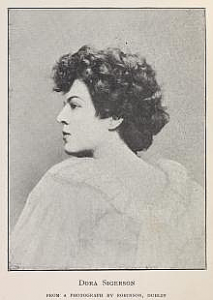
The Dead Soldier
(In memory of Thomas Ashe)
Where the sword has opened the way the man will follow
“Look! they came, the triumphant army!
Over yon hill see their weapons peeping!”
Still I spoke not but my wheel sent turning,
I closed my eyes for my heart was weeping,
My heart was weeping for a dead soldier.
Who is he who looks towards me ?
“’Tis no man but a gay flag flying,”
Red was his mouth and his white brow thoughtful,
Blue his eyes — how my soul is crying,
My soul is crying for a dead soldier.
“Kneel ye down, lest your eyes should dare them,
Kneel ye down and your beads be saying.”
“Lord, on their heads Thy wrath deliver,”
This is the prayer that my lips are praying,
My heart is praying for a dead soldier.
“Best cheer the path of the men victorious,
For he is dead and his blade lies broken,
His march is far where no aid can follow,
And for his people he left no token,
He left no token, the dead soldier.”
The way of the sword a man can follow,
See the young child with his gold hair gleaming.
When falls the oak must the acorn perish?
He lifts the blade and his eyes are dreaming,
He dreams the dream of the dead soldier.
THE END
Dora Maria Sigerson Shorter
(1866 – 1918)
The Dead Soldier
(In memory of Thomas Ashe)
• fleursdumal.nl magazine
More in: Archive S-T, Archive S-T, Sigerson Shorter, Dora Maria, WAR & PEACE
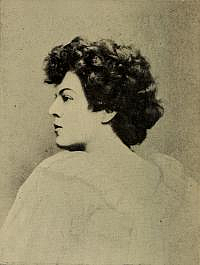
The Prisoner
All day I lie beneath the great pine tree,
Whose perfumed branches wave and shadow me.
I hear the groaning of its straining heart
As in the breeze its thin leaves meet and part
Like frantic fingers loosened and entwined;
I hear it whisper to the sighing wind,
“What of the mountain peaks, where I was born?”
As sharp tears drop I feel its falling thorn.
I see in the far clouds the wild geese fly,
Homeward once more, free, in the storm-swept sky.
Back to the land they loved, all, all, have gone,
How swift the flight by joy and hope led on.
“What of the mountain land where I was born?”
I cry, they pass, glad in the dawning morn,
Home to the moon-pale lake, the heath-clad hill,
And give no thought for one imprisoned still
All day I lie beneath the sad pine tree,
Whose groaning branches wave and shadow me,
Chained to the earth, the dark clay of the grave,
In helpless fashion feel its wild heart rave.
“Free, set free,” I hear its moaning breath,
Where liberty means naught, alas, but death
Ah, freedom is but death.
Dora Maria Sigerson Shorter
(1866 – 1918)
The Prisoner
• fleursdumal.nl magazine
More in: Archive S-T, Archive S-T, Sigerson Shorter, Dora Maria, WAR & PEACE
Thank you for reading Fleurs du Mal - magazine for art & literature